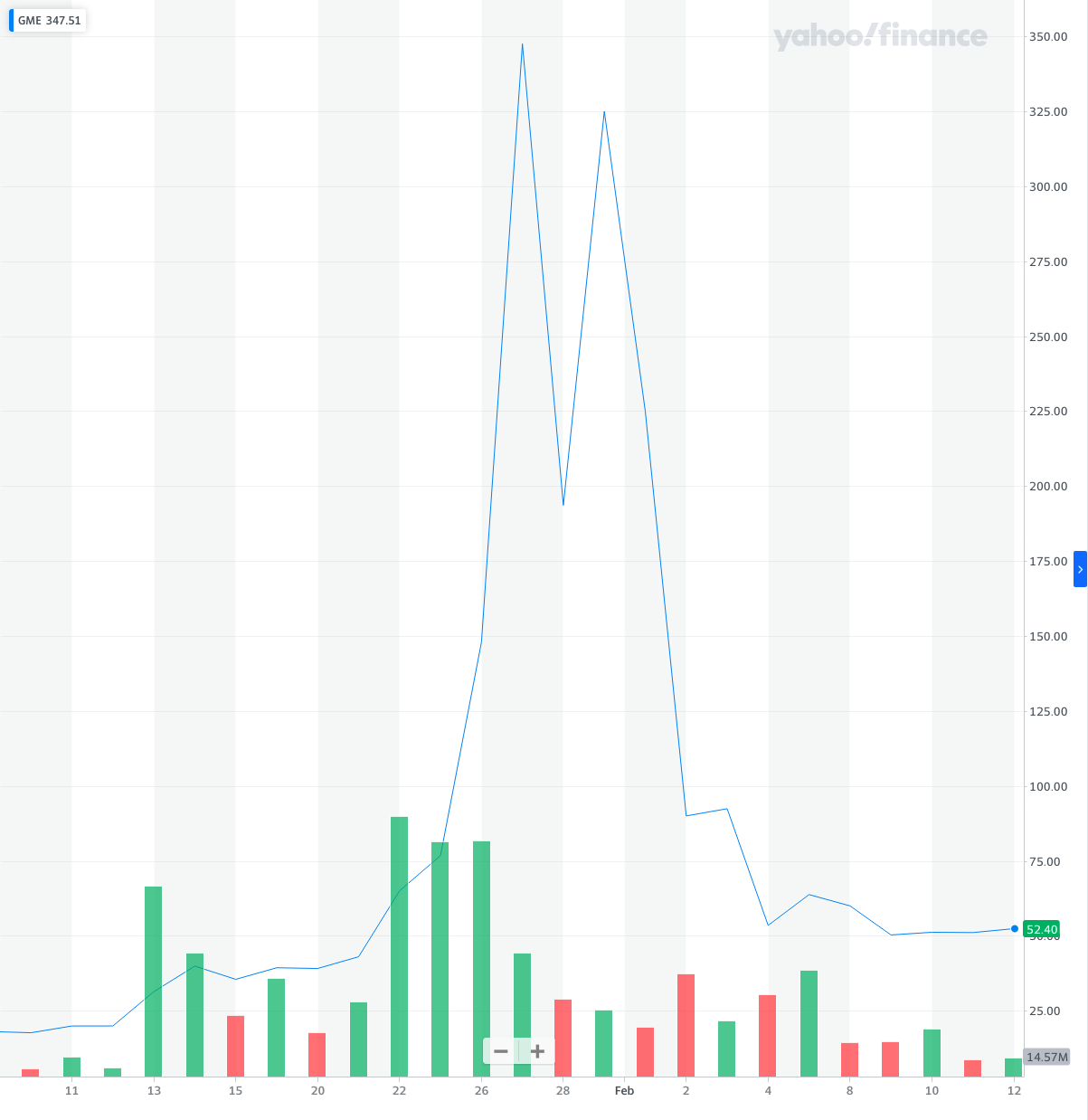
Folks like Melvin Capital and Citron Research think that GameStop is a dying business. The general public is optimistic though, be it for fundamental reasons (e.g. Ryan Cohen (chewy.com) will help GameStop can re-invent itself in the online space ), or for personal amusement, or FOMO. In particular, /r/wallstreetbets members are buying lots of call options . Or maybe it’s rage against the financial machine.
$GME rising is bad news for short sellers and call option writers. To hedge their positions, they need to buy $GME, which in turn raises the price of $GME. Unlike the greater fool theory in speculative schemes , the idea that short sellers will have to buy is quite comforting .
Googling news on GME shows prevailing memes: 10-Year-Old GameStop Investor Makes a +5,000% Return; 5 Things You Need to Know; Chinese Traders Betting What Will Pump Next; GME Short Squeeze - Who Will Surrender First?
argues that the narrative of small traders collectively causing mayhem to big players is overblown. For example, Melvin’s GME short position in Q3 2020 was .27% of the $20B AUM. Furthermore, firms diversify and hedge their positions to acceptable levels of risk. Thirdly, short interest did not seem to decrease in relation to $GME rising (short interest was 139.67% of the float on Jan 21st ). $GME, like many meme stocks, induces nostalgia, features a hero (Ryan Cohen) and a villain (Citron, Melvin), has a cataly-ish (console cycle) and is funny. Call options are attractive to risk-loving day traders because of the premium is cheaper than the share, but the upside is theoretically limitless. Secondly, options tend to be hedged in the underlying security. Finally, option buying begets option buying because the price moves up slightly and encourages to buyer to try and mint more money.
Melvin started 2021 with $12.5B in assets, and has lost ~30% in 2021. Melvin is atypical in that it was actively involved in shorts. Citadel is investing $2B and Point72 is adding $750M. Excluding 2021, Melvin has averaged a 30% return since its founding in Dec 2014. Left @ Citron also closed his short positions at 100% loss.
presents a narrative for how we got here. A bullish take on $GME appeared in /r/wallstreetbets in 2019/03. Michael Burry[!] also disclosed that his firm, Scion, was long GME (2019/02). Some WSBers wondered if $GME could tank enough for the sub to buy all its float. 2019/08: /u/DeepFuckingValue displays tendies from GME. 2020/04: /u/Senior_Hedgehog implores $GME owners to prevent brokerages from lending short their shares, as 84% of $GME shares were held short. 2020/08: Ryan Cohen[!] discloses 5.8m share stake in $GME. As the bandwagon started gaining steam, the motto wwas: never sell, never surrender 💎 ✋. Short-sellers were being called out: Melvin’s pedigreed Plotkin, and Citron’s Left (seasoned WSB villain after shorting Palantir and Nio).
Robinhood Markets and other brokerages limited retail investors from trades in $GME, but the same was not applied to big players. Stock trades are usually settled in two business days. Because $GME has been volatile, the Depository Trust & Clearing Corporation demanded more collateral (from $26B to $33.5B) from member brokers. That probably spurred the restrictions on retail investors. Aside, albeit curiously, Citadel’s data for the week showed that retail investors were buying vs. selling $GME at roughly the same rates.
- The GameStop Game Never Stops. Levine, Matt. www.bloomberg.com . Jan 25, 2021.
- Maximizing Stockholder Value by Becoming the Ultimate Destination for Gamers. Cohen, Ryan. RC Ventures LLC. www.sec.gov . Nov 16, 2020.
- Gamestop: Power to the Market Players. Lily Francus. nope-its-lily.medium.com . nope-its-lily.medium.com . Jan 24, 2021.
- Citadel, Point72 Back Melvin With $2.75 Billion After Losses. Burton, Katherine. www.bloomberg.com . Jan 25, 2021.
- How Reddit's WallStreetBets Pushed GameStop (GME) Shares to the Moon. Kochkodin, Brandon. www.bloomberg.com . Jan 25, 2021.
- An Update from Citron Research. Left, Andrew. www.youtube.com . Jan 27, 2021.
- GameStop Short Squeeze Is Rage Against the Financial Machine. Auther, John. www.bloomberg.com . Jan 27, 2021.
- Knowing When to Sell GameStop Stock at the Top Is Impossible. Levine, Matt. www.bloomberg.com . Jan 28, 2021.
- Reddit Traders on Robinhood Are on Both Sides of GameStop. Levine, Matt. www.bloomberg.com . Jan 29, 2021.